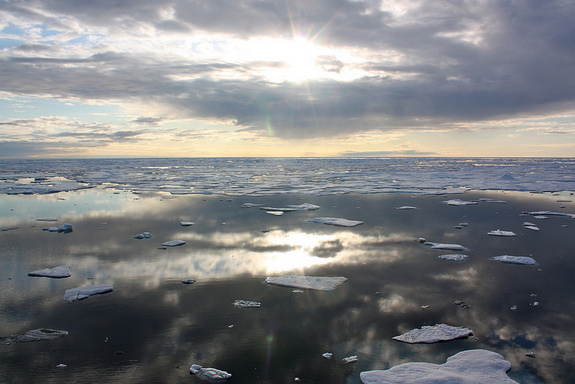Arctic Sea Ice Shatters Historic Record Low

Get the world’s most fascinating discoveries delivered straight to your inbox.
You are now subscribed
Your newsletter sign-up was successful
Want to add more newsletters?

Delivered Daily
Daily Newsletter
Sign up for the latest discoveries, groundbreaking research and fascinating breakthroughs that impact you and the wider world direct to your inbox.

Once a week
Life's Little Mysteries
Feed your curiosity with an exclusive mystery every week, solved with science and delivered direct to your inbox before it's seen anywhere else.

Once a week
How It Works
Sign up to our free science & technology newsletter for your weekly fix of fascinating articles, quick quizzes, amazing images, and more

Delivered daily
Space.com Newsletter
Breaking space news, the latest updates on rocket launches, skywatching events and more!

Once a month
Watch This Space
Sign up to our monthly entertainment newsletter to keep up with all our coverage of the latest sci-fi and space movies, tv shows, games and books.

Once a week
Night Sky This Week
Discover this week's must-see night sky events, moon phases, and stunning astrophotos. Sign up for our skywatching newsletter and explore the universe with us!
Join the club
Get full access to premium articles, exclusive features and a growing list of member rewards.
Arctic sea ice, the white cap that covers the watery northern edge of the planet, has melted back to a record low level.
However, the ice is unlikely to stop shrinking. Arctic sea melts through the summer usually reaching its annual minimum in September.
On Sunday (Aug. 26), Arctic sea-ice extent fell to 1.58 million square miles (4.10 million square kilometers), surpassing the previous low, set on Sept. 18, 2007, the U.S. National Snow and Ice Data Center (NSIDC) reports. Sea-ice extent refers to the area of ocean covered at least 15 percent by sea ice, according to the NSIDC.
The record low, set in 2007, stood at 1.61 square miles (4.17 square kilometers).
But this year's melt is unlikely to stop soon. The melt season still has another two or three weeks to go. [10 Things to Know about Sea Ice]
Continuous satellite records of sea-ice extent began in 1979. But in recent years, satellite data have shown a shift in the fluctuating ice cover. For example, including this year, the six lowest ice extents in the satellite record have occurred in the last six years, the NSIDC reports.
Scientists attribute the shift to a combination of natural forces, for example, a storm in early August coincided with an acceleration of melt that occurred at the same time. However, over time, the effects of winds, clouds and other natural conditions should, in theory, balance themselves out. It is the emission of greenhouse gases that alters the long-term trend by warming the planet, Walt Meier, a research scientist at NSIDC told LiveScience last year.
Get the world’s most fascinating discoveries delivered straight to your inbox.
This year's melt rate was much faster than the normal rate for this time of year, the NSIDC reported today (Aug. 27).
Sea ice matters to the animals, such as polar bears and walruses, that depend on it for habitat, and scientists worry the loss of ice could have serious consequences for them.
Sea ice also affects weather and global climate, because it reflects most of the sun's energy back out to space. If sea ice melts, the dark water beneath it absorbs most of the energy, which in turn enters the natural system. In this way, scientists believe the melting of sea ice will aggravate global warming.
Follow Wynne Parry on Twitter @Wynne_Parry or LiveScience @livescience. We're also on Facebook & Google+.
 Live Science Plus
Live Science Plus











